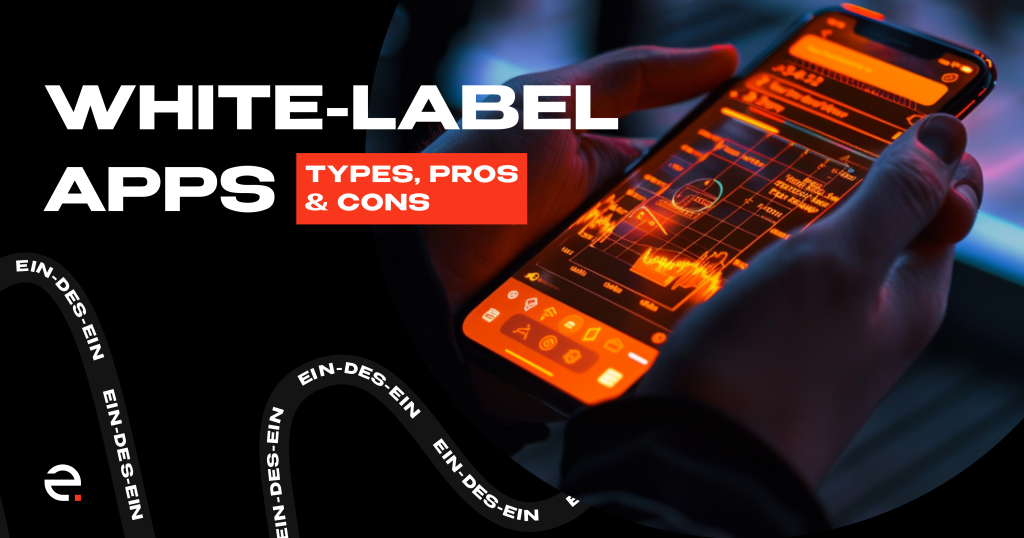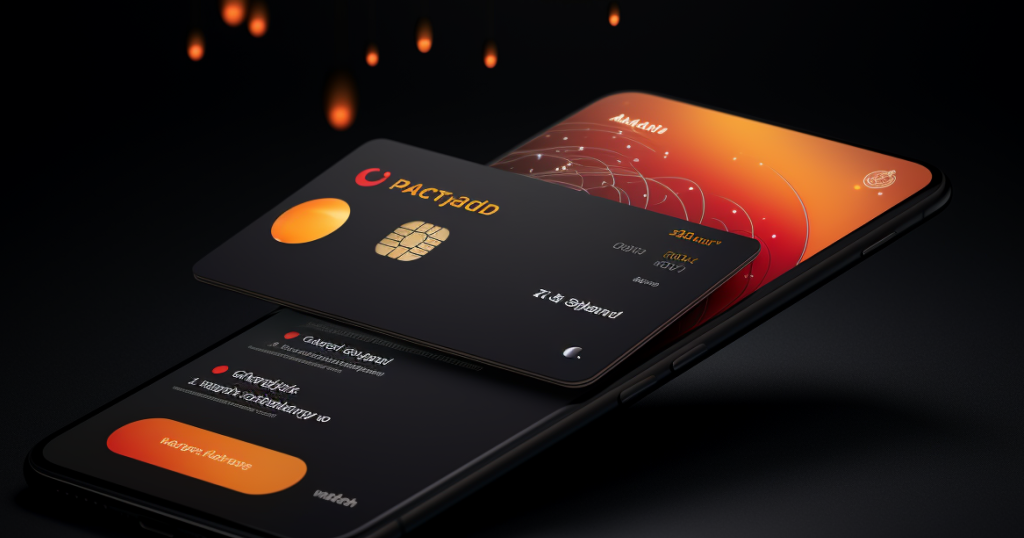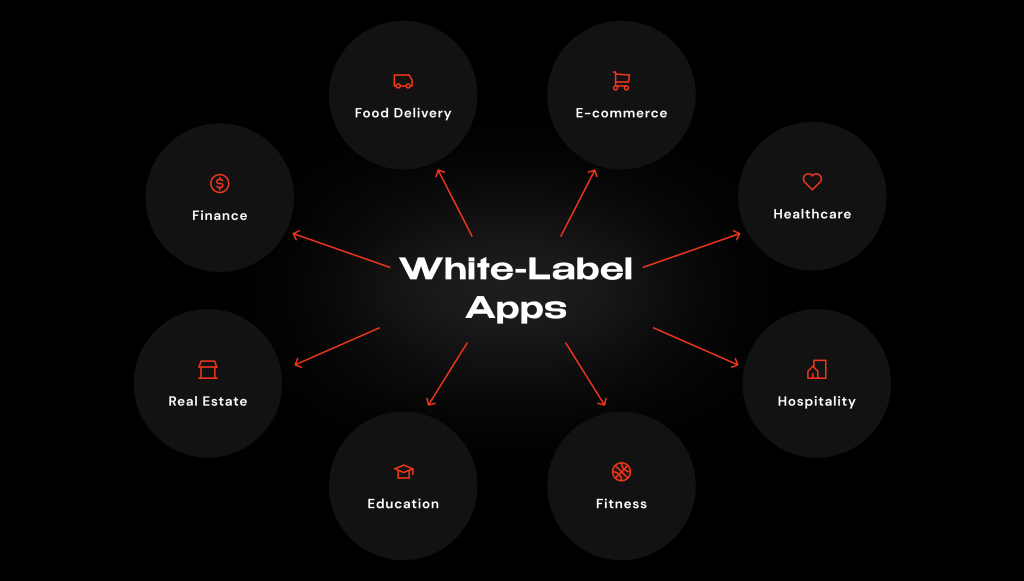What are White-label Apps? Types, Pros and Cons


In a highly competitive environment, companies of all sizes are seeking ways to start generating revenue faster through a modern mobile app without making significant investments in its development. It is evident that some market players (especially new ones) require a ready-made quickly customizable option to attract customers right away. This is where white-label apps come into play. In this article, we will discuss the pros and cons of the white label app development approach and determine whether a white label mobile app is suitable for your business type.
What is a white label mobile app?
A white-label app is a solution created by a third party but offered under your own brand. The reason it is faster and cheaper to create is that its backend—the way it works, its appearance, or format—is already established. A company, or an individual (or their hired design firms) customizes visual design, and toggles features on or off according to their goals or requirements. The core just remains the same.
What’s the difference between white-label mobile apps & custom mobile apps?
White-label options often resemble custom ones closely, as everything we see is tailored to fit a specific company, right? However, there are certain differences between these two approaches. Yes, both types serve the same purpose – helping you attract customers, drive sales, and generate revenue.
The main difference lies in the level of customization. When you get a white label application, you are allowed to make minimal design changes (colors, logos) while having all processes standardized (backend and other components are pre-written).
On the other hand, a tailored application is created specifically to meet your company’s demands. You are responsible for the entire feature set, architecture, logic, and backend, so it is a much more flexible option. For instance, if you have invented a unique method for learning foreign languages using unconventional techniques and repetition methods, a tailored solution will allow you to configure everything precisely as you imagine it, building custom functionality and architecture. Another scenario is if you run a travel agency and want to build a convenient booking tool for your clients, offering a selection of hotels to choose from. This is a fairly standard logic for many agencies, so investing in a tailored product with a backend written specifically for you is not very cost-effective.
Different Types Of White Label Apps
E-commerce
These white label apps come with features like product listings, shopping carts, payment gateways, and order tracking. By using this option, businesses can quickly enter the online retail market. Suitable for small to medium-sized retail businesses, boutique stores, and local shops looking to expand their customer base online!

Marketplace
These apps enable multiple vendors to list their products or services on a single platform. They include functionalities like vendor management, reviews, and ratings, as well as payment processing. This option allows businesses to launch a multivendor platform quickly and efficiently. Suitable for companies looking to create a platform similar to Amazon or eBay!
Community and Social Networking
Typical features here include user profiles, messaging, forums, and social sharing. Businesses can build a community around their brand, facilitating customer interaction and loyalty without spending on custom social networking products. Works for brands aiming to create a niche social network and event organizers who want to offer social networking features.

Education
These apps come with functionalities like course listings, video lectures, quizzes, and progress tracking. Educational institutions and training organizations can launch their own branded learning platforms quickly, providing a scalable solution for online education. Schools, universities, professional training organizations, and companies offering employee training programs can benefit from this option.
Booking and Reservation
Standard functionalities here include booking calendars, availability check, payment processing, and notifications to streamline the booking process. Service providers can manage bookings efficiently, reduce no-shows, and enhance customer satisfaction. Hotels, restaurants, travel agencies, and healthcare providers looking to offer easy booking and reservation services can choose this option.
Fitness and Wellness
Common functionalities include workout plans, diet or fitness tracking, and progress monitoring. Suitable for gyms, fitness trainers, yoga instructors, and wellness coaches looking to provide a holistic experience to sport enthusiasts.

Advantages of white-label app development
Cost-Effectiveness
White-label solutions come with a fixed price that is often considerably lower than the cost of tailored options.
Time Efficiency
Developing a custom option takes several months, or even years. White-label mobile apps offer a quicker alternative, as the foundational work is already completed.
Ease of Customization
While white-label apps come with pre-built functionalities, they offer a high degree of customization to match a company’s demands.
Reduced Technical Complexity
A ready-made solution requires minimal technical knowledge to implement.
Disadvantages of white-label app development
Lack of Uniqueness
Multiple companies can end up using the same basic option with only minor cosmetic changes as they have chosen the same provider.
Limited Customization
While these apps allow for some degree of branding, the core functionality and architecture are fixed. For those looking to implement innovative features, this lack of flexibility may be a major drawback.
Potential Quality Issues
Since these apps are designed to be generic, they may not always meet the quality standards expected by some companies.
Dependency on Third-Party Providers
If the provider experiences any issues, such as financial problems or changes in their business model, it directly impacts the product and its users. This dependency also limits a business’s ability to make changes and improvements to the solution.
Security Concerns
Security is a critical consideration for any mobile product, and white-label solutions may present certain risks. Since these apps are used by multiple businesses, vulnerabilities in the code may potentially affect all users. Additionally, businesses may have limited visibility into the security measures implemented by the provider, making it difficult to assess and mitigate risks.
When You Should Use a White Label App
When You Have A Standard Business Model
For businesses operating within standard models, such as retail, booking, or education, white-label apps already come with the core functionalities needed to run these operations smoothly. Example: A travel agency offering hotel bookings. Since the booking process is fairly standard across the industry, the travel agency simply customizes the app’s branding without needing to develop unique features from scratch.
When You Have A Limited Budget
Startups and small market players often operate on limited budgets. Sometimes, developing a custom app becomes too expensive for these organizations. Example: A local boutique looking to expand its customer base online. The boutique quickly launches an e-store and competes with larger retailers.
When There Are Short Time-to-Market Requirements
Custom product development usually takes at least several months, which might not be feasible for someone looking to capitalize on immediate opportunities. Example: A seasonal event organizer who needs a tool to manage ticket sales and event information. The organization is able to launch the solution in a matter of weeks, ensuring they are ready well before the event date.
How much does it cost to create a white label mobile app?
The base price typically includes the cost of the pre-built application itself. Basic ones cost between $5k to $20k, while more advanced ones range from $20k to $50k or more. Adding advanced features like in-app purchases or analytics increases the overall cost. Simple customizations like color schemes, and font adjustments are usually included in the base price. However, more extensive changes and unique UI/UX modifications incur additional costs, ranging from $ 2k to $10k.
Most providers offer maintenance packages – regular updates and technical support. These packages range from $500 to $5k per month, depending on the level of support. Some of them also charge licensing fees which vary widely. Annual licenses range from $1k to $10k. Hosting fees are another consideration, they range from $50 to $500 per month, depending on the server capacity and traffic requirements.
Which industries use white-label apps?

Should You Choose a White Label App?
Let’s explore the key questions you should consider.
- What is My Budget?
- What is My Time Frame? Do I need to launch quickly to capitalize on a market opportunity or meet tight deadlines?
- Do I Need Custom Features?
- What Are My Long-Term Goals? Do I plan to significantly expand the functionality in the future?
- Who is My Target Audience? What expectations do they have regarding my product?
- What Is the Competitive Landscape? Is differentiation crucial in my competitive landscape?
Conclusion
White-label applications offer a transformative solution for companies looking to enter the digital market quickly and efficiently. This approach is particularly beneficial for small firms aiming to establish a unique mobile presence without the associated high costs and time commitments. It means you will capitalize on market opportunities faster and allocate more resources to refining your revenue generation strategy. If you undertsand that your concept requires more air and flexibility, we will help you build a custom app that covers it all!
FAQ
-
What are white-label mobile apps?
- For those wondering what are white label apps, the answer is pretty simple. A white label app is a pre-built option developed by third-party providers that you rebrand and customize. The white label app development approach is ideal for those willing to save on coding!
-
What are the different types of white-label products and services?
- Here, the possibilities are endless. In the tech sector, you will find ready-made CRM systems and e-commerce tools. Financial services include banking, payment gateways, and investment platforms. Marketing tools may cover content or social media management.
-
What are the benefits of white labeling apps?
- The white label mobile app development approach is all about the flexibility to adjust parameters according to your identity, as a result you get a consistent UX. Offering such a mobile app white label platforms enable market players to focus on their strong competencies.



